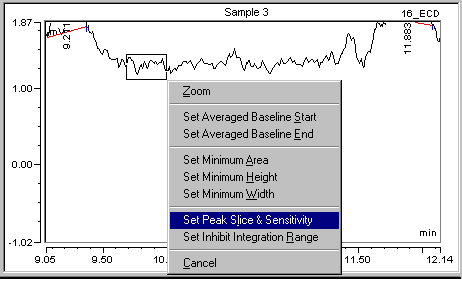Defining Detection Parameters
![]() Modifying the Peak Recognition Algorithm
Modifying the Peak Recognition Algorithm
Whether signal variations are interpreted as peaks or not, is usually set automatically. Manual modification of this "recognition sensitivity" is possible via the combination of the Peak Slice and Sensitivity detection parameters. Changing the parameters is required, for example, in chromatograms with unusually wide (many minutes) or very narrow (< 0.1sec) peaks.
Another way to define the peak recognition algorithm is to define both parameters graphically.
How To
Enlarge a baseline section so that the noise is clearly visible.
In the chromatogram, right-click to select an area from which the baseline runs out neither at the top nor at the bottom.
Select Set Peak Slice & Sensitivity on the context menu.

The width of the selected area is entered into the QNT Method as peak slice and the height is entered as sensitivity at the time of the left edge of the area. Enter 0.000 as time onto the Detection tab page or move the parameters in the chromatogram with the Detection Parameter Tool so that this peak recognition algorithm applies to the entire chromatogram.
![]() Note:
Note:
You can undo the graphical input of detection parameters. Click one of the tables of the QNT Editor and select Undo on the Edit menu. (In the chromatogram itself, you can only undo the modifications of the currently open chromatogram.)
The peak recognition algorithm considers signal variations only beyond the adjusted sensitivity values. Peaks below this threshold are interpreted as noise.
Both parameters affect peak recognition only, not integration! The area calculation (integration) is not affected.